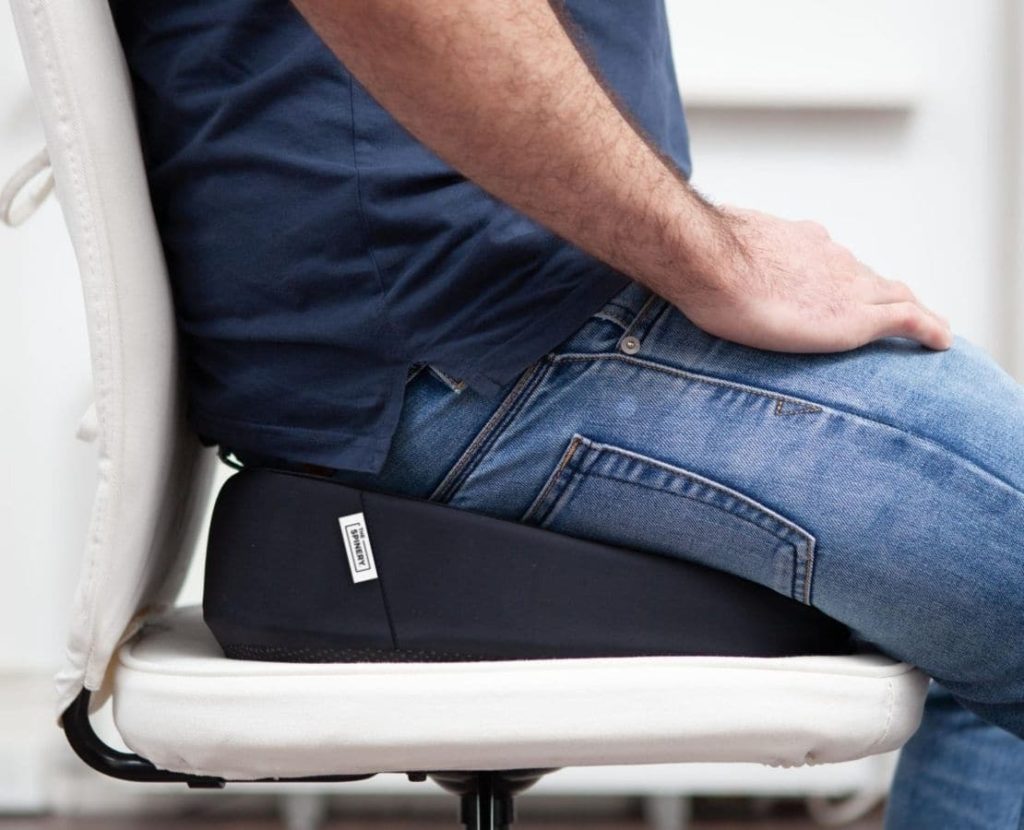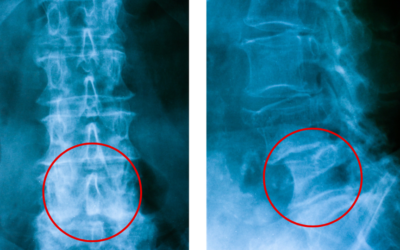It’s no secret that sitting for long periods of time is bad for your health. But did you know that it could also lead to headaches? In this blog post, we explore the link between sitting and headaches and offer some tips on how to avoid them. Read on to learn more!
As a general rule, sitting may cause headaches due to that the blood flow slows and pools in your legs. This can cause fluid to leak out of your blood vessels and into your tissues. The increase in the fluid can lead to headaches, fatigue, and even dizziness.
If you are experiencing headaches while sitting, I believe I can help. My YouTube channel, 30 years of Chiropractic practice, trained ergonomist, published book, engineered solutions, and successful Kickstarter campaign makes me an expert on this subject!
All Day Comfort & Support
What Does a Posture Headache Feel Like?
Many people experience occasional headaches, but for some, headaches can be a regular occurrence. If you suffer from frequent headaches, you may be wondering if your posture could be to blame. So, what does a posture headache feel like?
Typically, posture headaches are caused by poor alignment of the spine and head. This can lead to tension in the neck and shoulders, which can then cause pain to radiate up into the head. The pain is often described as a dull ache or pressure, and it may be worse when you move your head or neck. You may also notice that your posture headache gets worse at the end of the day or after spending long periods of time sitting or standing. If you think you may be experiencing a posture headache, it’s important to see a doctor or chiropractor for an evaluation. They will be able to determine if your posture is indeed the cause of your headaches and develop a treatment plan to help relieve your pain.
Black Friday: 35% Off Today
Typical Delivery 1-3 Days
How Do You Sit to Prevent Headaches?
If you suffer from headaches, you may be wondering how to sit to prevent headaches. The good news is that there are a few simple tips that can help. First, make sure that your back is straight and your shoulders are relaxed. Secondly, keep your head level and your chin tucked in. Third, don’t cross your legs or arms, as this can lead to tension in the neck and shoulders. Finally, take breaks every 20 minutes or so to stand up and stretch. By following these simple tips, you can help to prevent headaches and enjoy a more comfortable workday.
How Do You Get Rid of Posture Headaches?
If you suffer from frequent posture headaches, there are some simple steps that you can take to help reduce or eliminate these painful episodes. The most important is to make sure that you are drinking plenty of high-quality water throughout the day. Here is a video that I made on this subject:
This will not only keep you hydrated, but it can also help to relieve tension in your muscles, soothe headaches, and alleviate stress.
Get Your Sitting Posture Right
Here is a simple step you could take in order to improve your own physical positioning which may reduce the risks associated with headaches while sitting:

Ergonomic Seat Cushion
- When you sit on the ergonomic seat wedge (above), your spine will be aligned and balanced while other parts of your body like the shoulders or neck may feel less tension. Sit upright with hips higher than knees so that this position engages more muscle groups at once!
All Day Comfort & Support
Is a Positional Headache Serious?
As anyone who has ever had a headache knows, it can range from annoying to debilitating. There are many different types of headaches, and each one has its own symptoms and causes. One type of headache that is often mistaken for a tension headache is a positional headache. Positional headaches usually occur when you change the position of your head, such as when you sit up after lying down. The pain is usually mild to moderate, and it goes away after a few minutes. However, if you have a positional headache that is severe or lasts for more than a few minutes, it could be a sign of a more serious condition. If you experience severe positional headaches, it is important to see a doctor to rule out any underlying medical conditions.
Black Friday: 35% Off Today
Typical Delivery 1-3 Days
What Does a Low Blood Pressure Headache Feel Like?
A low blood pressure (hypotension) headache can be hard to understand if you’ve never experienced it yourself, but they typically manifest as a feeling of intense pressure or pain in the head. This discomfort is typically concentrated on the front of the head, around the temples and forehead, though some people may experience it more diffusely throughout their head. In addition to the pain itself, other common symptoms can include dizziness, changes in vision, ringing in the ears, nausea, and even fainting. While this type of headache can often be uncomfortable and debilitating, it usually resolves on its own once your body re-regulates your blood pressure levels. If your low blood pressure causes frequent headaches or you are experiencing any other serious symptoms along with them, however, it is important to see a doctor for professional treatment options.
When Is Headache Serious?
Headaches are one of the most common health complaints, with most people experiencing them at some point in their lives. In most cases, headaches are harmless and can be easily treated with over-the-counter medication. However, there are a few warning signs that can indicate when a headache may be more serious. For example, sudden onset headaches, headaches that are accompanied by dizziness or nausea, and headaches that get worse with movement are all causes for concern. If you experience any of these symptoms, it’s important to see a doctor as soon as possible to rule out any underlying medical conditions. With proper diagnosis and treatment, most serious headaches can be effectively managed.
Why Do My Head Hurts Every Day?
There can be a number of different reasons why your head hurts every day. One possible cause is dehydration, which can leave you feeling tired, foggy-headed, and in need of a good rest. If you are getting enough sleep or replacing lost fluids through the consumption of water and other hydrating beverages, other potential causes of daily headaches may include high levels of stress or anxiety, poor diet and nutrition, or medical conditions like migraines or cluster headaches. Whatever the reason for your frequent headaches may be, it is important to work with your doctor in order to get to the root of the problem and find a solution that works for you. Whether this involves making lifestyle changes, trying different medications, or undergoing targeted treatment therapies, there are many options available to help you regain control of your health and relieve this persistent annoyance. So don’t let those daily headaches get you down – take charge today and start exploring all your options!
Can Low BP Cause Headaches?
As anyone who has ever had a headache knows, it can range from mildly annoying to debilitating. There are many different causes of headaches, but one potential cause is low blood pressure. When blood pressure drops, it can cause the blood vessels in the brain to constrict. This can lead to headaches, as well as dizziness, fatigue, and blurred vision. In some cases, low blood pressure can also be a symptom of an underlying health condition. So if you are experiencing persistent headaches, it is important to see a doctor to rule out any potential medical causes. However, in many cases, low blood pressure is not a cause for concern and can be easily treated with lifestyle changes or medication.
How Long Does the COVID Headache Last?
While the effects of COVID-19 can vary from person to person, many people have reported experiencing a long-lasting headache after being infected. This is likely due to the effects of the virus on certain neurotransmitters in the brain, which can cause inflammation and disruption in normal neural signalling. Other symptoms that may accompany this headache include brain fog, dizziness, nausea, and a general feeling of malaise or fatigue. In most cases, the headache will begin shortly after infection and last for several days before gradually tapering off. However, some people may experience ongoing symptoms for longer as their body continues to work to recover from the virus. So ultimately, the answer to this question depends on many different factors and should be discussed with a healthcare professional if you are concerned about your own recovery from COVID-19.
What Is a High-Pressure Headache?
A high-pressure headache is a type of headache that is caused by an increase in pressure in the head. This can be due to a variety of causes, including dehydration, hypertension, or a brain tumour. High-pressure headaches are typically characterized by a throbbing sensation in the head, as well as nausea and vomiting. In some cases, they can also lead to vision problems. If you experience a high-pressure headache, it is important to see a doctor so that the underlying cause can be treated. Left untreated, high-pressure headaches can cause serious health complications.
What Are the 4 Types of Headaches?
There are four main types of headaches: tension, cluster, migraine, and sinus. Tension headaches are the most common type of headache and tend to feel like a tight band around the forehead. Cluster headaches are rare but can be extremely painful, often described as a burning or piercing sensation. Migraine headaches are often accompanied by symptoms such as nausea and sensitivity to light and can last for days or even weeks. Sinus headaches are caused by congestion in the sinuses, and usually involve pain in the forehead or temples. While all types of headaches can be frustrating, there are treatments available that can help to provide relief. Over-the-counter painkillers, such as ibuprofen or acetaminophen, can often help to ease tension and migraines headaches. For cluster headaches, prescription medications may be necessary. And for sinus headaches, decongestants can be helpful in clearing the nasal passages and relieving pressure.
What Kind of Headaches Does COVID Cause?
As the world grapples with the COVID pandemic, many people are wondering what kind of headaches the virus might cause. While the majority of COVID cases are mild, some people do experience headaches as a symptom of the virus. In fact, a recent study found that headaches are one of the most common symptoms reported by people with COVID. The study found that around one in four people with COVID reported experiencing a headache. The most common type of headache reported was a tension-type headache, followed by a migraine. However, it is important to note that not everyone who experiences a headache will have COVID. If you experience a headache, it is important to speak to a medical professional to rule out other causes.
Summary
Headaches are a common problem, and many people don’t know the cause. We have explained some of the most common causes of headaches, and we hope this information has been helpful. If you experience regular headaches, please make an appointment with your doctor to find out if there is a medical reason for your pain.





